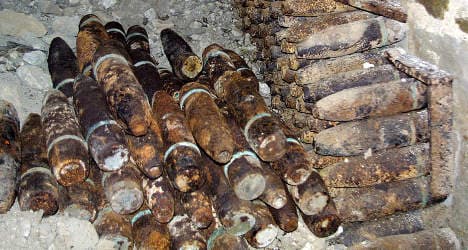France stockpiling its own 'chemical weapons'

The UN may have passed a resolution to confiscate Syria’s 1,000 tonnes of chemical weapons but France, one the permanent members of the Security Council, is still, somewhat unintentionally, stockpiling its own arsenal of toxic weapons.
The chemical weapons stored in bunkers at a miltary camp in north east France are not of course like the modern arsenal used to devastating and deadly affect recently by Syria’s Bashar al-Assad, but date back almost 100 years to World War One.
Since the end of the war in 1918, France has gradually been stockpiling its own collection of chemical weapons mainly due to farmers finding the potentially deadly munitions in their fields, which now mark the sites of the former battlegrounds of The Great War.
As revealed by French radio Europe1 this week, around 260 tonnes of shells almost 100 years old, are being kept under close guard at Suippes military camp to the east of the city of the northern city of Reims, in bunkers initially built to house nuclear weapons.
The munitions may be old but they are certainly not harmless and are kept under watch 24 hours a day, seven days a week.
“These munitions will soon be 100 years old. They are oxidised and have lost all their markings,” a minesweeper Pierre-Yves Chaneaux, told Europe1 radio on Monday.
“These shells contain phosgene, mustard gas and hydrogen cyanide. They are dangerous products,” he added.
So why does France still have 17,000 shells and other munitions nearly 100 years after World War ended , you might ask?
The problem stems from the fact that under the rules of the Convention on the Prohibition of Chemical Weapons, that came into force in April 1997, the weapons must be destroyed in a certain way. SInce that day authorities have simply had to collect in all the shells that are found and store them.
“Becasue of this convention, we are no longer allowed to dispose of chemical weapons in ways that create hazards to personnel or the environment, so they have been stored,” said Channeaux.
To solve the problem a new factory is currently being built in the Aube region of north east France, that will enable authorities to safely dispose of the century-old weapons.
However the factory won’t open until 2016 and according to reports it will still take a decade to destroy the thousands of shells at a cost of €100 million.
Comments
See Also
The chemical weapons stored in bunkers at a miltary camp in north east France are not of course like the modern arsenal used to devastating and deadly affect recently by Syria’s Bashar al-Assad, but date back almost 100 years to World War One.
Since the end of the war in 1918, France has gradually been stockpiling its own collection of chemical weapons mainly due to farmers finding the potentially deadly munitions in their fields, which now mark the sites of the former battlegrounds of The Great War.
As revealed by French radio Europe1 this week, around 260 tonnes of shells almost 100 years old, are being kept under close guard at Suippes military camp to the east of the city of the northern city of Reims, in bunkers initially built to house nuclear weapons.
The munitions may be old but they are certainly not harmless and are kept under watch 24 hours a day, seven days a week.
“These munitions will soon be 100 years old. They are oxidised and have lost all their markings,” a minesweeper Pierre-Yves Chaneaux, told Europe1 radio on Monday.
“These shells contain phosgene, mustard gas and hydrogen cyanide. They are dangerous products,” he added.
So why does France still have 17,000 shells and other munitions nearly 100 years after World War ended , you might ask?
The problem stems from the fact that under the rules of the Convention on the Prohibition of Chemical Weapons, that came into force in April 1997, the weapons must be destroyed in a certain way. SInce that day authorities have simply had to collect in all the shells that are found and store them.
“Becasue of this convention, we are no longer allowed to dispose of chemical weapons in ways that create hazards to personnel or the environment, so they have been stored,” said Channeaux.
To solve the problem a new factory is currently being built in the Aube region of north east France, that will enable authorities to safely dispose of the century-old weapons.
However the factory won’t open until 2016 and according to reports it will still take a decade to destroy the thousands of shells at a cost of €100 million.
Join the conversation in our comments section below. Share your own views and experience and if you have a question or suggestion for our journalists then email us at [email protected].
Please keep comments civil, constructive and on topic – and make sure to read our terms of use before getting involved.
Please log in here to leave a comment.